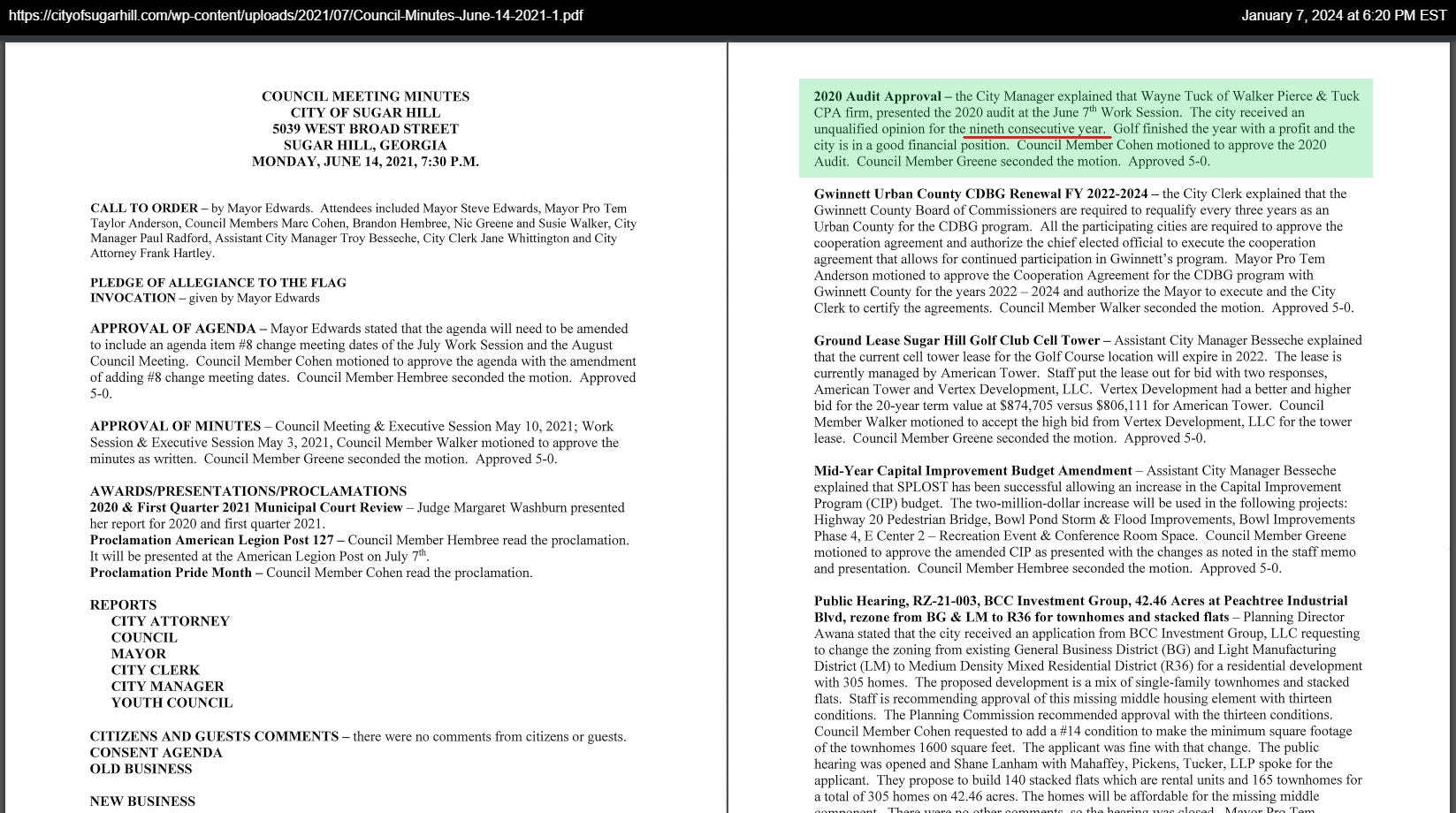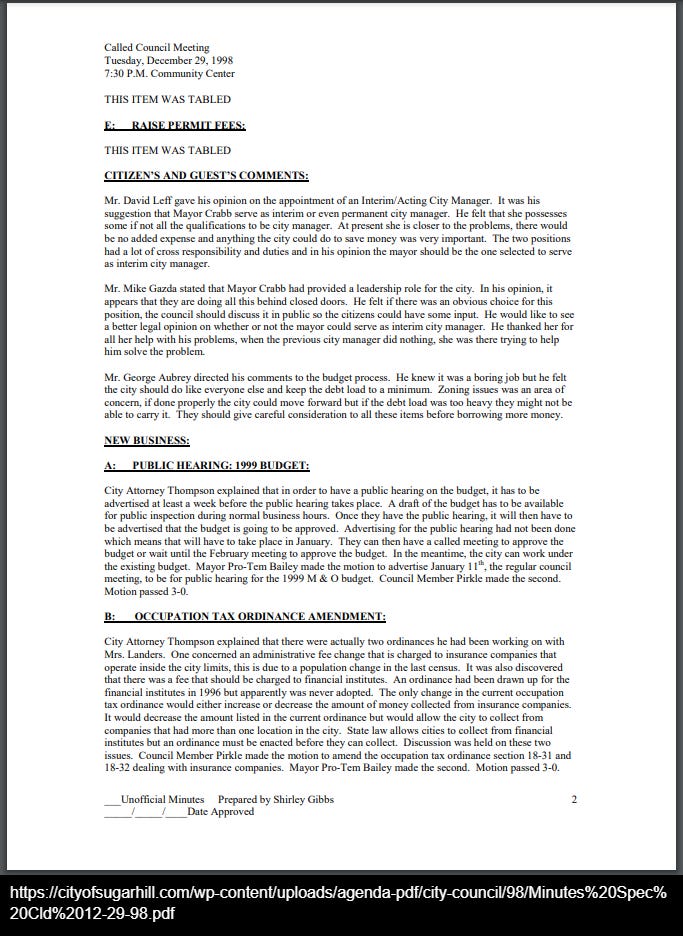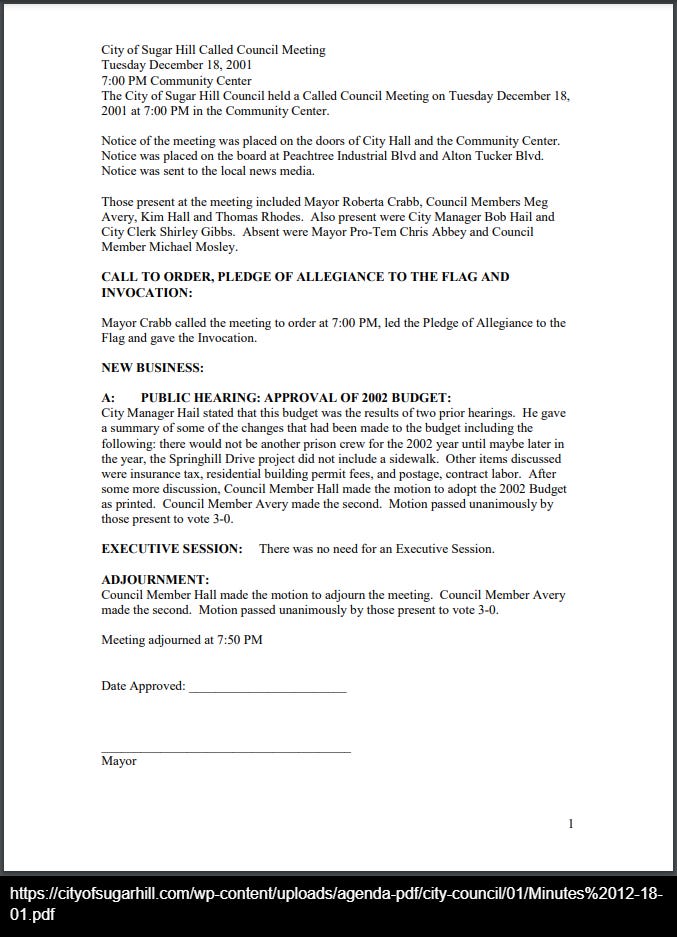December Special Called Meeting of the Mayor and City Council
The Sugar Hill City Council convened at noon on Thursday, December 28 for a Special Called meeting.
Overall, this was a strange meeting, handled strangely.
According to the agenda posted on the City’s website Wednesday morning (the day before), the purpose of the last-minute meeting was to accept and submit the 2022 audit of the City’s finances and approve an amendment to the 2022 budget. But, the City also included an Executive Session on the agenda. The public is not allowed to attend the Executive Session, and no one knows what it is about beforehand, or even afterward, unless the City Council comes back and conducts a vote in public, as required by law.
At the meeting, City officials did vote to accept the 2022 audit (a vote that is not required) and approved an amendment to square up the 2022 budget (which is required, as far as I know). In a rare move for this government, they chose not to go into Executive Session at this meeting even though it was on their agenda. They also chose not to say why.
Although City officials acted like this meeting was all about the audit, something was conspicuously missing - the actual audit. The audit was not on the City’s website at that time and was not made available until late the next day. No hard copies of the audit were distributed to the public. No slides were presented. Only one number was mentioned, and that was an extra $8 million that the City has added to its General Fund.
So, what was this meeting really about? Mostly, the City did what they do at most meetings. They congratulated themselves in their typical circle of self-love that has been a trademark of all their public meetings in recent years.
As soon as Mayor Brandon Hembree asked the City Council for comments, he looked first and only at Council Member Taylor Anderson as the rest of a City Council that loves to hear themselves talk sat noticeably still and silent. As Anderson spoke for about five and a half minutes of this nineteen-minute meeting, the purpose of this meeting came into focus.
It was a final chance for angry politicians to use the taxpayer-owned City Council Chambers as a bully pulpit and strike at four of their least favorite residents in a taxpayer-funded meeting in which these residents were not allowed to speak back.
The Mayor and remaining City Council members were also sending a clear signal that they have no intention of welcoming or working with the Council Members selected by the Sugar Hill electorate, choosing instead to play politics and double down on the attitude and tactics that just cost their politician friends their seats.
December 29, 2023 - Special Called Meeting
Audits are typically presented to the Mayor and City Council in the middle of the year. The City requested an extension for this audit for reasons they had not previously disclosed on their official City website, the official social media channels, or at any of the previous public meetings.
At this meeting, different reasons were given for the audit extension. City Manager Paul Radford said the audit was actually due in June, and gave several reasons for the extension request. His stated reasons were that the auditor handles a lot of local government clients and was “substantially overburdened”, the auditor was undergoing a peer-review audit, the introduction of new rules that require the City to account for all of its leases as a part of its annual audit, and additional auditing due to the City’s receipt of federal ARPA funds. He also said that when the City requests an extension, those extensions are automatically granted in six-month increments.
No one provided a reason why the audit was either not complete or not revealed to the public until the final few days of the six-month extension with no prior public discussion by the elected officials or City Manager. One or more people in that group should have inquired about the completion date of the audit by the beginning of December, around the time of the monthly City Council Meeting. If anyone did, it was kept quiet at the public meetings.
Wayne Tuck of the auditing firm Walker, Tuck, & Pierce presented the audit to the Mayor and Council. “We feel the whole financial statements, without any qualifications, or unqualified, fairly present the financial position of the City. And that again, is the the gold standard, the expectation, whether you are a Fortune 500 company, whether you are a non-profit, or a local government.”
Elected officials bragged about the “unqualified” audit, just as they have in past years. An unqualified audit simply means that the financial statements have been thoroughly examined, and the auditor believes they are an accurate representation of the City’s financial state for evaluation by elected officials, the State of Georgia, banks, citizen journalists, and residents.
To sum up, the City of Sugar Hill is not making errors in its bookkeeping, nor is it “cooking the books,” or fraudulently misrepresenting its finances.
Residents are still the final judge of whether those finances are appropriate and in the best interest of the community.
After Tuck’s presentation, Mayor Brandon Hembree opened the floor for discussion and questions by Council Members. Member Taylor Anderson asked Tuck, “In your experience, what percentage of local governments receive an unqualified audit?” Tuck responded, “I would say it would be in the high 90’s.”
Hembree then went straight back to Anderson.
First, Anderson congratulated the current Mayor and Council extensively for the audit, and said it proves that the City is financially transparent. He then began a thinly veiled diatribe against current Council Member-Elect Gary Pirkle, stating, “I’m proud of the nine straight unqualified audits, I’m also embarrassed that it’s only nine straight,” alluding to his repeated accusations of massive audit issues during Pirkle’s previous time in office, for which he seems to hold the Former Mayor personally responsible. During his speech, he did not specify which fiscal year or years he was referring to or what kept the audits from being unqualified.
According to the City’s current story that 2022 is the ninth consecutive year with an unqualified audit, years 2014-2022 were fine, but year 2013 would have had issues. This is interesting, considering that the City also bragged about nine consecutive unqualified audits in June 2021 when Walker, Tuck, & Pierce presented the 2020 audit. That would mean that the 2012-2020 audits were unqualified, meaning that the 2013 audit had NO issues.
Anderson concluded his lamentation of the prior audits by saying that “at one point, an IRS agent visited the City due to lack of reporting of withholding taxes. I can’t IMAGINE that level of incompetence!” He did not indicate a date (even in the ballpark) for the visit, what the IRS agent concluded, or what action, if any, was taken by the IRS as a result of the visit.
He then launched into a tirade against the incoming elected officials for criticizing the City on social media for calling a meeting in the midst of the holiday season with only a day’s notice.
Although Anderson saw nothing wrong with the approach taken by the current Mayor and Council to this Special Called Meeting, he obviously felt very wronged by the criticism. He went into the Wayback machine to provide a list of four (4) Special Called Meetings from 1998-2006, during which current Council Members-Elect Gary Pirkle and Meg Avery previously served as City Council Members, and Pirkle later served as Mayor, and proceeded to provide a critique of them. Anderson said the current meeting was merely procedural, but claimed those past meetings were about more substantial topics and went on to cite the specific topics.
A review of those agendas (which he didn’t provide at the meeting but you can find at the end of this article) reveals some slight truth to what he says, but also reveals significant misrepresentation on his part.
While the topics were more substantial, they were not being introduced for the first time at a Special Called Meeting, a detail Anderson leaves out. Part of the topics were clearly in the “Old Business” part of the agenda, meaning they were a continuation of discussions that had taken place at previous meetings. And some of the topics he mentioned were actually tabled, so although the topic came up, the decision was pushed to a later date. One topic Anderson called out (freeport exemptions) was a vote to place the topic on a ballot so voters could make the final decision, and it was tabled until the following month.
The longest Special Called Meeting Anderson mentioned, from December 1998, featured citizen and guest comments, and three residents spoke before the Mayor and Council. Citizen and guest comments were not allowed at the 2023 Special Called Meeting.
Interestingly, the budget discussions in the meetings he cited reveal that prior City Councils were having deeper discussions about budgets and in the case of the 2002 budget, more budget hearings than we have now, requiring additional meetings.
Also interesting is that although Gary Pirkle presided over the December 20, 2006 Special Called Meeting as Mayor, Anderson’s friend Marc Cohen actually made the motion to approve the 2007 budget at the meeting, and then Council Member Steve Edwards, whose praises Anderson sang earlier in the meeting, made the motion to approve the West Broad Street design after the topic had already been discussed at a previous meeting. If Pirkle and Avery can be held personally responsible for every Special Called Meeting at which THEY were present, why doesn’t Anderson hold Cohen and Edwards responsible for that meeting?
Anderson also chose not to compare the notification provided for the past meetings versus the notice provided for the current meeting, which was the crux of the public criticism from the newly elected Council Members. According to the City’s meeting minutes, the past meetings were advertised on roadside announcement boards and signs on the City Hall and Community Center doors.
The City only announced the current Special Called Meeting the day before on its website and with the legally mandated notification in the Gwinnett Daily Post legal section, which most people don’t read. Notification could have easily been provided on the City’s official Facebook page by someone in the City’s sizeable and growing Marketing Department, but it was not.
Anderson also chose not to respond to community concerns about the fact that the City had placed an Executive Session on the agenda. No one outside the City government ever knows in advance what Executive Session discussions will entail. Since the recent power-shifting elections, the lame-duck City Council spent a total of $385,000 immediately after Executive Sessions for land purchases in the City’s “Downtown” area.
Although he didn’t address the announcement and subsequent disappearance of the Executive Session, basic logic dictates one of three things happened:
The City added an Executive Session to the agenda because they planned to do one, but canceled their plans for unstated reasons.
They just automatically put an Executive Session on every agenda because they have an Executive Session almost every time they meet.
They didn’t actually know until the last minute whether they were having an Executive Session or not.
The City has not revealed which of these things happened. All three scenarios do reveal, at the bare minimum, poor meeting management on the City’s end.
The City was very quick to create a press release for marketing purposes, publishing it at about the same time as the Special Called Meeting. However, they were substantially slower to handle the real business of releasing the actual audit document to the public. It was not placed in the expected location on the City’s Finance page until late the following day.
Current elected officials said this meeting wasn’t special or different.
And they’re right about that. This meeting wasn’t special or different. It was the same kind of meaningless dog and pony show that has taken place week after week in Sugar Hill in the almost five years I’ve been observing them.
They’re also right about another thing. Elected officials need to be watched because there is always more to the story.
To see the actual City of Sugar Hill 2022 Financial Audit or the City’s other publicly provided financial documents for yourself, visit the City of Sugar Hill Finance page.













